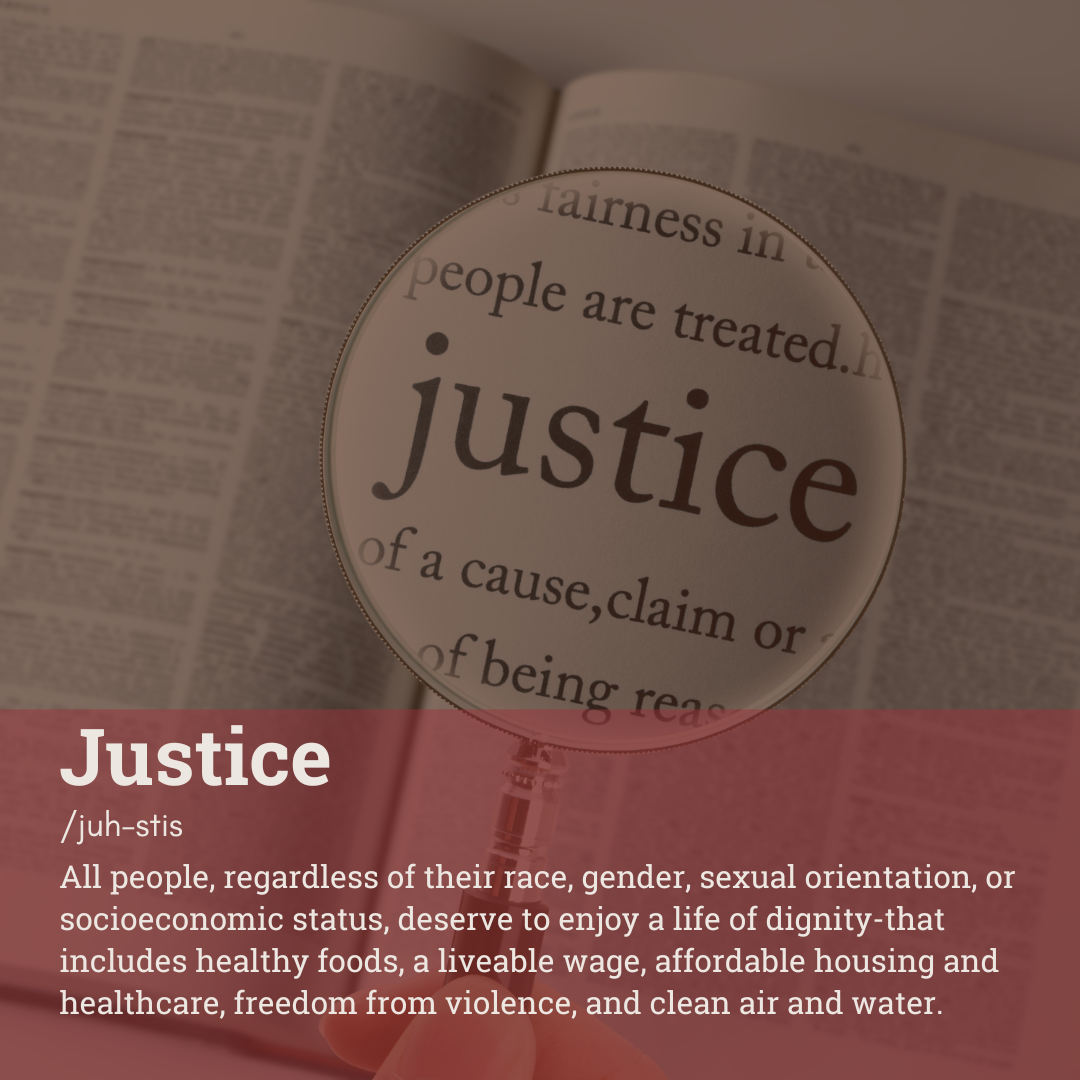J is for January, but in our world, it’s also for Justice!
At Whyhunger, we believe that justice means that everyone has equitable access to the resources they need to survive and thrive. That may sound broad, but at its core, we mean that all people, regardless of their race, gender, sexual orientation, or socioeconomic status, deserve to enjoy a life of dignity – that includes healthy foods, a liveable wage, affordable housing and healthcare, freedom from violence, and clean air and water.
Ending hunger and poverty requires more than compassion and charity, it requires justice. Injustice is a root cause of hunger, preventing people from growing, accessing, and affording nourishing food in their own communities and disproportionately impacting communities of color. Hunger persists because low wages, systemic racism, climate injustice, and wealth inequality persist.
In the U.S., low wages, underemployment, and lack of benefits and healthcare limit which vital services and goods families can afford. More than 44 million Americans—disproportionately Black, Indigenous, and other communities of color—often have to make the difficult choice between buying food or paying for housing, child care, education, medicine, and transportation.
Further, 40% of Americans are living just one paycheck away from poverty, making impossible decisions between feeding their families and paying for other necessities. In a just world, communities don’t have to make these choices, and they definitely don’t need to rely on donated cans to feed themselves and their families. In a just world, all people enjoy their human right to fresh and culturally appropriate foods, by accessing and affording markets full of nutritious food options, or the resources and land to grow their own.
Justice is possible! In fact, 90% of all Americans believe hunger is a solvable problem, and 59% agree it’s impossible to solve without addressing the root causes of economic injustice, racism, and lack of access. And our partners are on the frontlines, including
- La Via Campesina, which represents 200 million farmers, landless people, rural women and youth, Indigenous people, and agricultural workers around the world working to organize, change legislation and protect land, water, seeds and their rights to housing, health care, education and food.
- The Tamil Nadu Women’s Collective, which as a member of The World March of Women, who teaches nutrition education and trains other women and children to grow food sustainably in India, and
- The Black Church Food Security Network which helps to establish gardens and agricultural projects on Black Church-owned land to link local farmers with congregations to expand food access.
And these are just a few examples! Around the world our partners are working to end hunger for good.
Together, we can build a world without hunger. The mounting climate crisis, increasingly harmful corporate practices, and persistent social injustices require a unified response from all of us. Join our community of organizations, funders, artists, and supporters committed to uprooting hunger. Together and with the leadership of our grassroots partners, we can build just food systems that nourish all people and the environment.
For more content like this, check out our website, instagram, Facebook, TikTok pages.
Kids Corner
Justice might mean many different things to different people, but we’re here to break down what it means to us at WhyHunger, and to ask what it means to you!
Each person is made up of a lot of different pieces that make us who we are – from what we look like, to where we’re from, to our gifts and hobbies and everything else in between. And just like a puzzle, we can’t understand anyone fully until we put all the pieces together! Justice means we don’t let differences between us get in the way of our responsibility to treat them with fairness and respect.
A lot of people struggle to find and afford everything they need to live a happy and healthy life. When we talk about food justice, we mean that every family can easily find and afford fresh and nutritious meals every day, without worry. WhyHunger works together with farmers, food makers, and organizers all over the world to make sure that their communities can grow and buy the food they need for themselves and their families.
There are many different kinds of justice that are all connected to each other. For example, food justice is related to our health, along with the environment. A healthy environment is important for growing fresh foods, which is important for nourishing us and keeping us healthy! That’s why justice isn’t just any one thing, it’s actually a bunch of little pieces put together, just like us.
There are a lot of other groups just like WhyHunger that make it their goal to help end injustices around the world so everyone can live their happiest and healthiest lives, including La Via Campesina, The World March of Women, The Black Church Food Security Network, and so many more.
Food for thought:
We want to hear from you too! Here are a few questions to get you started:
- Something is ‘unjust’ when people aren’t treated in an equal and fair way. Have you ever seen or heard about something ‘unjust’ in your school or neighborhood?
- What does justice mean to you? And if you can, ask a family member what justice might mean to them! How are your ideas similar or different?



